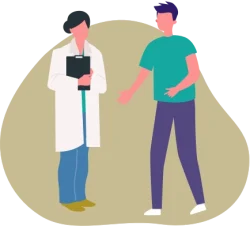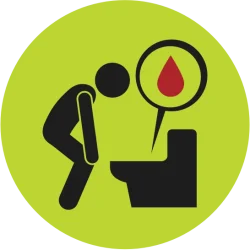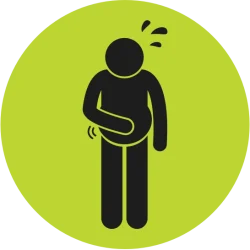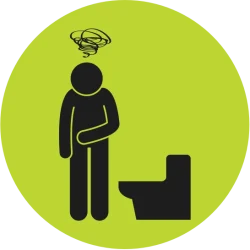
This Bowel Cancer Awareness month, The Marie Keating Foundation has partnered with patient ambassadors and medical professionals to share an important message with you all.
Colorectal cancer, often referred to as bowel cancer is cancer that appears in the colon (large bowel) or in the rectum (large bowel closest to the anus). It is the second most common cancer in men and the third most common cancer in women in Ireland. Colorectal cancer is the third leading cause of cancer death women and men.
We are urging the public to get to know bowel cancer’s signs and symptoms, to speak to their GP if they notice a change in their bathroom habits and avail their free FIT test from Bowel Screen if aged over 60. Crucially, we are also urging the public not to wait until they reach screening age to be aware of their bowel health –if you notice any of the signs and symptoms or have any concerns about changes in your body, have #NoRegrets and immediately talk to your GP
You are never too young for Bowel Cancer.
Bowel Cancer- Facts

In Ireland, around 2,562 people each year develop cancer of the bowel, also known as colon, rectal or colorectal cancer.

Bowel cancer affects both men and women, 1,467 are men and 1,095 are women.

The risk increases with age – usually diagnosed in people over age of 55 but can occur in people under 50 years of age.

When caught at its earliest stage, 65% will survive for + 5 years.
Bowel cancer- Signs and symptoms

Blood in, or on, the poo (stool or bowel motions) – the blood may be bright red or dark in colour.

A change in normal bowel habits such as diarrhoea or constipation for no obvious reason, lasting longer than six weeks.

Unexplained weight loss.

Pain in the abdomen or rectum (back passage).

A feeling of not having emptied your bowel properly after a poo (bowel motion).
Other diseases apart from bowel cancer can cause all of the above symptoms. However, if you experience any of these symptoms, have #NoRegrets, make an appointment with your GP and get it checked.
The NCRI database shows that the incidence of colorectal cancers among those under 50 is rising rapidly - the incidence rate has almost doubled between the years of 1994 and 2019[1, 3]. This trend is mirrored around the world. According to the National Cancer Institute, the incidence of colorectal cancer in those under the age of 50 has increased by 51% since 1994[4]. 1 in 10 diagnoses of colorectal cancer in Ireland is to someone aged under 50.[5]
“Early diagnosis of cancer is crucial and would lead to a reduction in the number of avoidable deaths from cancer and improve overall survival rates. Early detection leads to more positive outcomes and likelihood of curing the cancer, therefore it is of the utmost importance we focus on this as a society. Campaigns like #NoRegrets play a key role in increasing public awareness of colorectal cancer, its signs, symptoms, and potential barriers to diagnosis. This year’s campaign also highlights this is not only a disease of older age, but bowel cancer can also and does affect those under screening age, so it is of profound importance that you go to your GP and get checked if you have any concerns about changes in your body.”
Professor Ray Mc Dermott, Consultant Medical Oncologist, Clinical Lead Cancer Trials Ireland
Ambassador Stories
Learn more about our ambassadors
References:
- Ireland, N.C.R., Cancer in Ireland 1994-2019: Annual report of the National Cancer Registry. NCRI, Cork, Ireland. National Cancer Registry Ireland (2021)
- Benitez Majano, S., et al., 1558O - Worldwide comparison of colorectal cancer survival by topography and stage at diagnosis (CONCORD-2). Annals of Oncology, 2018. 29: p. viii562.
- Zaborowski, A.M., et al., Characteristics of Early-Onset vs Late-Onset Colorectal Cancer: A Review. JAMA Surg, 2021. 156(9): p. 865-874.
- Siegel, R.L., et al., Cancer Statistics, 2021. CA Cancer J Clin, 2021. 71(1): p. 7-33.
- O'Reilly M, Linehan A, Krstic A, Kolch W, Sheahan K, Winter DC, Mc Dermott R. Oncotherapeutic Strategies in Early Onset Colorectal Cancer. Cancers (Basel). 2023 Jan 16;15(2):552. doi: 10.3390/cancers15020552. PMID: 36672501; PMCID: PMC9856676.
Kindly supported by:
![]()






